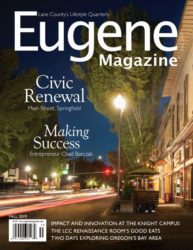When the first generation of public tool libraries cropped up during the 1970s, a handful of Eugene neighborhood groups jumped on board with lending projects. But like similar efforts in many communities, the projects disappeared by the ’80s. Lately, however, there’s been momentum for a new generation of “libraries of things.”
Enter the ToolBox Project: a local model in the new era of community sharing libraries. ToolBox is a grassroots, nonprofit organization providing no-cost/low-cost building repair and garden tools for transforming Eugene homes, businesses, and neighborhoods.
Beth Sweeney and Anya Dobrowolski met in late 2013 while grad students at the University of Oregon. They were both searching for personal projects that would carry them beyond their degree studies. They both perceived that, although Eugene is very tightknit, it had no community-based lending libraries for items other than books. This realization inspired them to craft a shared vision for a series of modular tool libraries: multiple locations, multiple neighborhoods, many participants, and many tools.
“We are activists for our cause,” says Sweeney. “We wanted to create something.” According to Dobrowolski, the cause they embraced was about leading a charge to help make the planet a better place. “The idea of sharing,” says Dobrowolski, “is the core of what makes us human. And, perhaps, it’s the next step in building a more peaceful world.”
Optimism plus pragmatism: key elements in many formulas for success.
The ToolBox Project currently boasts more than 125 members. It has acquired over 200 tools ranging from tape measures to table saws. In a little over two years, the project has evolved past a pair of hopeful dreamers loaning hand tools from the back of a pickup to a cadre of volunteers dispensing dozens of hand and power tools weekly from a utility van. More recently, the ToolBox Project has settled into a tidy, newly constructed tool shed on a permanent site at the Friendly Street Church of God near downtown Eugene.
Celebrate the ToolBox Project’s recent grand opening by signing on as a member, volunteering time, or donating tools. Sharing can be its own reward.

